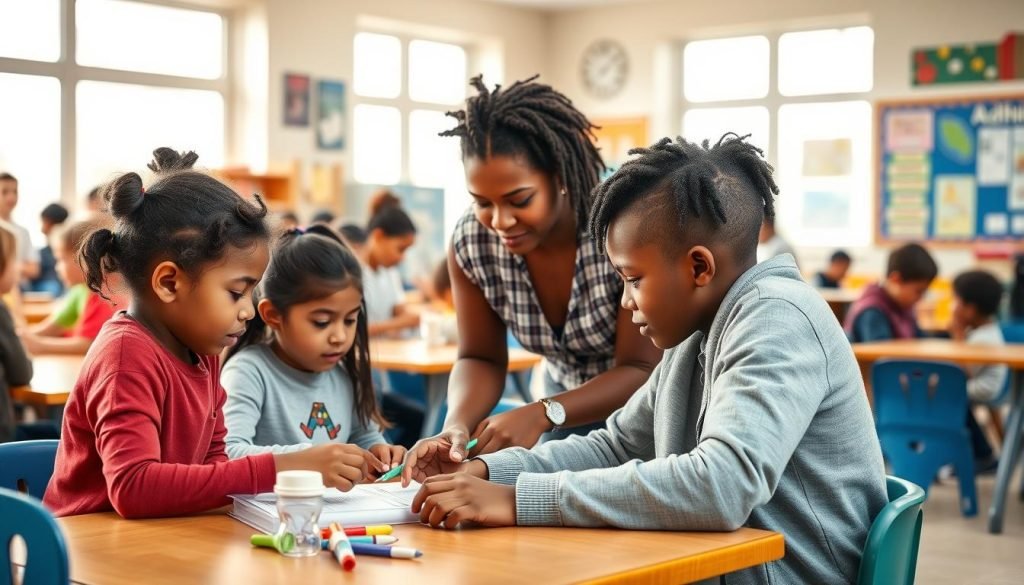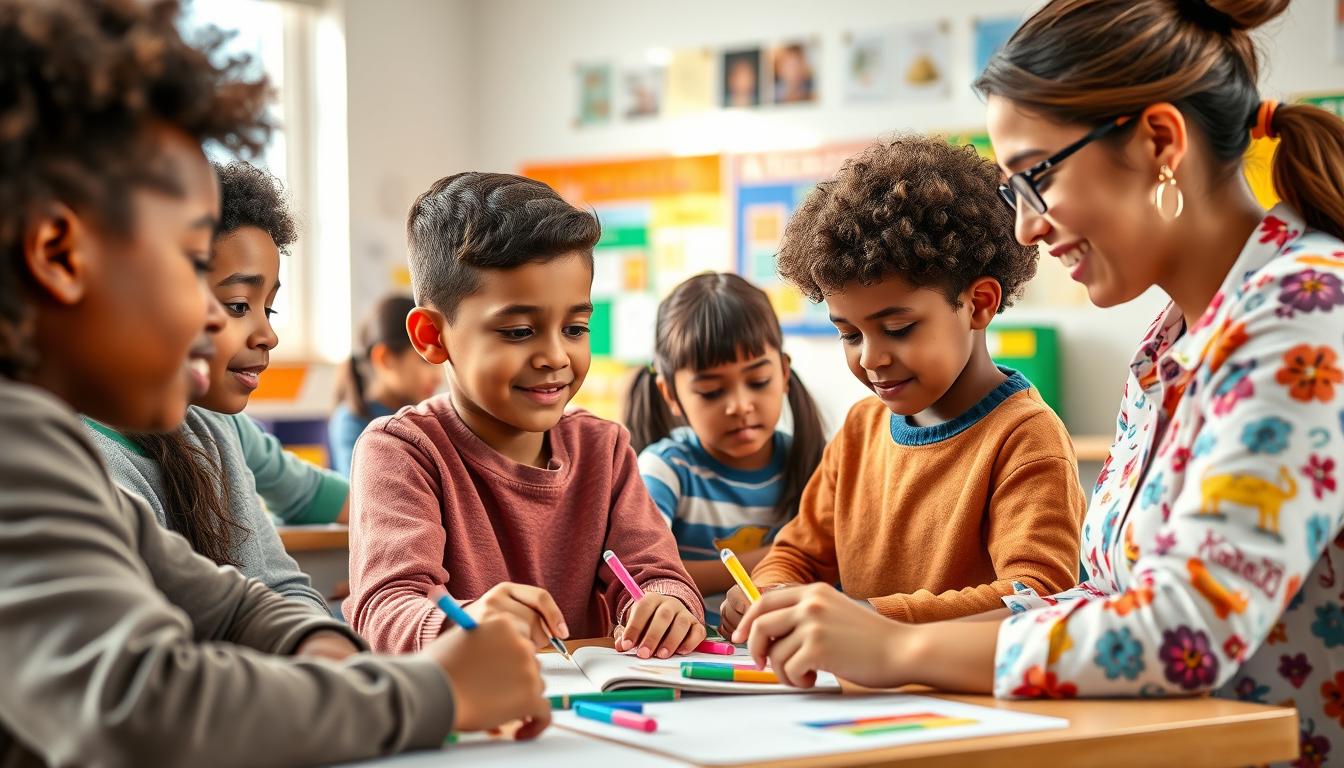About 5% of kids in the U.S. have ADHD, so you might see your child facing academic challenges. ADHD is complex, affecting more than energy levels. It impacts focus and organization, making school tasks tough for your child.
Despite common beliefs, kids with ADHD can succeed with the right support and learning strategies. Effective educational help can improve their school performance greatly. It’s encouraging to see their potential for success with dedicated effort and personalized educational strategies.
But how do you start helping your child with ADHD thrive in school? First, understand how ADHD affects their learning. Then, apply strategic support at school and home. By focusing on these areas, you can help your child overcome ADHD challenges and succeed.
Understanding ADHD and Its Impact on Learning
Kids with ADHD often show behaviors that greatly affect their learning and performance in class. These effects touch almost 10% of kids aged 3-17 years. Many face challenges in school, making it hard for them in regular classrooms.
Students with ADHD can struggle with keeping focus, managing time, and finishing tasks. These issues become bigger because ADHD often comes with other disorders like ODD, autism, and Tourette’s syndrome. These add to their learning and social struggles.
Learning in specific areas, like writing, is hard for at least 60% of kids with ADHD. They find it tough to put their thoughts on paper clearly. This is a key skill for school. The high number of ADHD diagnoses and its link to lower school success show we need special teaching strategies for these students.
- 70% of kids diagnosed with ADHD have at least one learning disorder.
- ADHD is more common in boys than girls, which brings extra challenges in learning.
- These kids often have trouble with reasoning and understanding, which harms their grades.
It’s key to know how ADHD affects learning. Kids with ADHD struggle to follow instructions, remember things, and control their actions. This is vital for doing well in school. Often, their troubles are seen as not wanting to learn, which isn’t true.
It’s not that they don’t want to learn. It’s that ADHD makes it harder for them. If we create a supportive learning space for them, we can lessen these problems and make school better. Helping them overcome ADHD’s impact on learning is crucial for teachers, parents, and the community. This way, these kids can meet their full potential, despite their struggles.
Effective Communication with Your Child’s Teachers
For kids with ADHD, working with teachers is key. By keeping in touch through parent-teacher communication, you greatly help your child’s learning and happiness. Research shows effective conversation and being involved can boost a child’s grades by 30% in ADHD cases.
Staying updated on how your child is doing at school is crucial. It’s important parents and teachers start off with trust and openness. Share everything useful about managing your child’s ADHD, like what works at home or changes in treatment. Sharing this info helps create better support in the classroom.
| Statistical Highlight | Importance |
|---|---|
| 70% of teachers seek further ADHD training | Indicates a high demand for professional development in ADHD support |
| 60% of parents stress the need for open communication | Shows significant consensus on the importance of transparent dialogue |
| 50% reduction in homework issues through effective collaboration | Conveys the tangible benefits of active parental involvement |
| 25% improvement in academic skills with consistent support | Reflects the clear academic advancements from sustained support |
Using structured updates, like weekly emails or a shared digital chart, is a great move. Teachers can share insights here, showing if ADHD support is working. Surveys say regular updates make ADHD’s classroom impact less overwhelming for about 40% of teachers.
Making classrooms better for ADHD kids is gaining support. It’s encouraging to see. When teachers learn more and parents help, teachers get better at handling ADHD.
To sum up, being active and informed improves your child’s school experience. Let’s keep working together for our kids’ growth and success. Each small effort can make a big difference in their school journey.
How Schools Can Support Students with ADHD
Students with ADHD need a supportive learning environment to succeed in both school and life. Schools are key in providing ADHD support in education. They use special strategies like IEP and 504 Plans. These approaches help meet each student’s unique needs and create inclusive learning spaces.
School support for ADHD varies based on what each student needs. By using structured routines and clear rules, schools help these students focus better. They also use tools like color-coded materials and visual plans. These help lower stress and anxiety, making it easier for students to engage in their lessons.

- IEP and 504 Plans are important for tailoring learning to each student’s needs. They may include more time for tests, assignments that match how students learn best, and technology for better organization and time management.
- Placing kids with ADHD closer to the teacher aids their concentration. Studies show this can boost their focus and participation by up to 30%.
- Short breaks for movement throughout the day helps manage impulsiveness and keeps focus sharp. This strategy has been shown to improve academic results in students with ADHD.
- Regular talks between schools and families about IEP and 504 Plans are crucial. They ensure everyone understands the aims and supports in place, letting these plans adjust as students grow.
By making these adjustments, educators do more than help with schoolwork. They build a strong foundation for their student’s growth, confidence, and relationship-building skills. Highlighting the need for strong ADHD support in education benefits not just those with ADHD, but the entire school community. It creates a caring, empathetic atmosphere for all.
Academic Strategies to Help Your Child Succeed
Helping a child with ADHD succeed in school requires special strategies. We know how tough it can be to manage ADHD in class. So, we use methods like classroom behavior management, personalized lessons, and careful planning. This way, your child doesn’t just get by, they flourish.
Managing classroom behavior is key. Making the classroom less distracting really helps a child focus. For example, seats arranged to avoid distractions and a clear view of the teacher work well. Also, teacher reminders and chances to move help reduce squirming and boost focus.
Also, personalizing learning for kids with ADHD is critical. This means splitting big tasks into smaller ones and using tech like lesson recordings. Such tailor-made approaches let each child learn at their own speed without feeling swamped.
Using positive feedback can also support learning. Reward systems for small wins build confidence and encourage good study habits. For instance, celebrating completed homework promotes persistence and motivation.
Looking at statistics shows how vital these methods are:
| Strategy | Impact | Statistic |
|---|---|---|
| Structured routines | Improves behavior and focus | 80% of parents notice behavior improvements |
| Individualized education plans (IEPs) | Enhances academic performance | 75% parental satisfaction with services |
| Positive reinforcement | Increases homework completion rates | 40% increase in homework completion |
| Use of technology | Enhances learning retention | 60% of students benefit from technology like recording apps |
Your child’s success with ADHD at school really depends on using the right approaches for their needs. We’re here to support you through it all. With our help, your child won’t just keep up, but excel. Let’s turn these challenges into chances for growth and success.
Home Environment Adjustments
Making your home ADHD-friendly is key to helping your child grow. We think a living space with fewer distractions boosts focus. This is true for homework, play, or rest times. By using ADHD-friendly homework strategies, we can help them reach their full potential.
Start by making a quiet spot at home where your child can easily do homework. Studies show that a peaceful, organized place helps kids with ADHD focus better. Things like schedules and checklists are great for keeping a routine. They help with staying on track and making fewer choices.
- Having a regular routine lowers stress for your child.
- Enough sleep and healthy eating are key for controlling ADHD.
- Exercise helps with energy and focus.
- Rewards for good behavior and effort work really well.
It’s also important to stick to clear rules and quick consequences. This makes discipline easier and sets definite expectations. Such consistency is just as necessary at home as in school. Research confirms that it greatly helps kids with ADHD adjust better and behave well.
Remember, our homes offer comfort, support, and a sense of safety. A home that supports ADHD can affect both school success and overall happiness. It builds a strong base for our kids with ADHD.
Include your child in making these home changes. Let them have a say. This approach builds their independence and confidence. They learn to manage better. By working together, we create homes that support learning and growth for our children with ADHD.
Conclusion
We’ve looked at the tough parts of school life for kids with ADHD together. We learned how important it is to understand and help with ADHD’s effects on learning. Around 5% of kids in school around the world are diagnosed with ADHD. This shows the big need for supportive schools and special services for them.
Your hard work for your child’s success is key, along with help from schools and changes at home. a supportive home and school, plus a good treatment plan, can really help your child do better in school. If you need more help, we’re here to support you on the path to success in education. Working together with teachers, using strategies that work, and finding the right help are all steps to a brighter future for our kids. Let’s keep fighting, changing, and winning for them.






